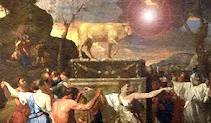Template:Golden statues: Difference between revisions
No edit summary |
|||
| Line 1: | Line 1: | ||
== Golden statues == | == Golden statues == | ||
[[File:Calf.jpg|right]] | [[File:Calf.jpg|right|300px|thumb|Was this superstition or an economic system?]] | ||
Revision as of 11:27, 21 October 2016
Golden statues

The practice of creating statues made of gold or silver was not mere superstition, but a practicality stimulated by fear and a lack of faith.
The people literally deposited their gold, as well as other goods, into a common purse [1] sacrificed the right to it, and took, in turn, some sort of exchangeable token. The gold was poured or plated into a large statue for all to see. The wealth of the community was melted together.
The result of this common purse was that no one person could leave in the face of an enemy or trouble without leaving behind the wealth deposited in the golden idol.
Their scarabs or tokens were worthless except within their community. The priests of the temple kept track of all the complexities of this monetary system and, of course, the profits from interest and usury.
The reserve fund
This was a common plan found in many governments of that day and this. They deposited their family wealth in a central vault controlled by trusted men of government, in this case the golden calf was their “reserve fund”.[2] Moses understood how it was a wicked thing to bind the people by anything more than love for one another, a passion for mercy and justice and the way of God the Father.
This practice was used in Athens, who called their golden statue of a god the “reserved fund”. In 406 B.C., at the close of the Peloponnesian war, after a naval disaster, Athens equipped and manned its new fleet by sending the gold statue of the god Nike (in the Parthenon) to the mint.
These idols were not just superstitious mumbo-jumbo, but paganism with a purpose. They were reserved funds established to protect the people and guarantee their loyalty. It also secured the power of the ruling elite. The king of Sodom had put more value on ”his” human resources than the treasure of his city. [3]
Aaron also knew these “arts of the temple” and accommodated the people. But Moses was outraged with the people for entrusting their family wealth in this unrighteous mammon. He knew it would return people to the bondage of Egypt. He called out the Church in the wilderness to undo that mess, the same as Christ called out the Church.
- ↑ "My son, if sinners entice thee, consent thou not. If they say, Come with us, let us lay wait for blood, let us lurk privily for the innocent without cause: Let us swallow them up alive as the grave; and whole, as those that go down into the pit: Cast in thy lot among us; let us all have one purse:" (Proverbs 1:10-14)
- ↑ Athens, under the leadership of Pericles, was driven to her golden goddess, their reserve fund, and compelled to melt it down and coin it into money Peloponnesian Wars. They eventually minted a plated bronze tetradrachms in Athens during the hard times which followed the Athenian collapse, viz. from B.C. 406-393. “In 393 the wretched bronze money of necessity was cried down, the Town Crier being sent round to proclaim that silver was once more to be the only legal tender :” ARIST. Eccl. 819.
Aerarium (from Lat. aes, in its derived sense of ``money) the name (in full, aerarium stabulum, treasure-house) given in ancient Rome to the public treasury, and in a secondary sense to the public finances. The treasury contained the moneys and accounts of the state, and also the standards of the legions; the public laws engraved on brass, the decrees of the senate and other papers and registers of importance. These public treasures were deposited in the temple of Saturn, on the eastern slope of the Capitoline hill... In addition to the common treasury, supported by the general taxes and charged with the ordinary expenditure, there was a special reserve fund, also in the temple of Saturn, the aerarium sanctum (or sanctius), probably originally consisting of the spoils of war, afterwards maintained chiefly by a 5% tax... The later emperors had a separate aerarium privatum, containing the moneys allotted for their own use, distinct from the fiscus, which they administered in the interests of the empire. From a 1911 Encyclopedia - ↑ "And the king of Sodom said unto Abram, Give me the persons, and take the goods to thyself." (Genesis 14:21)